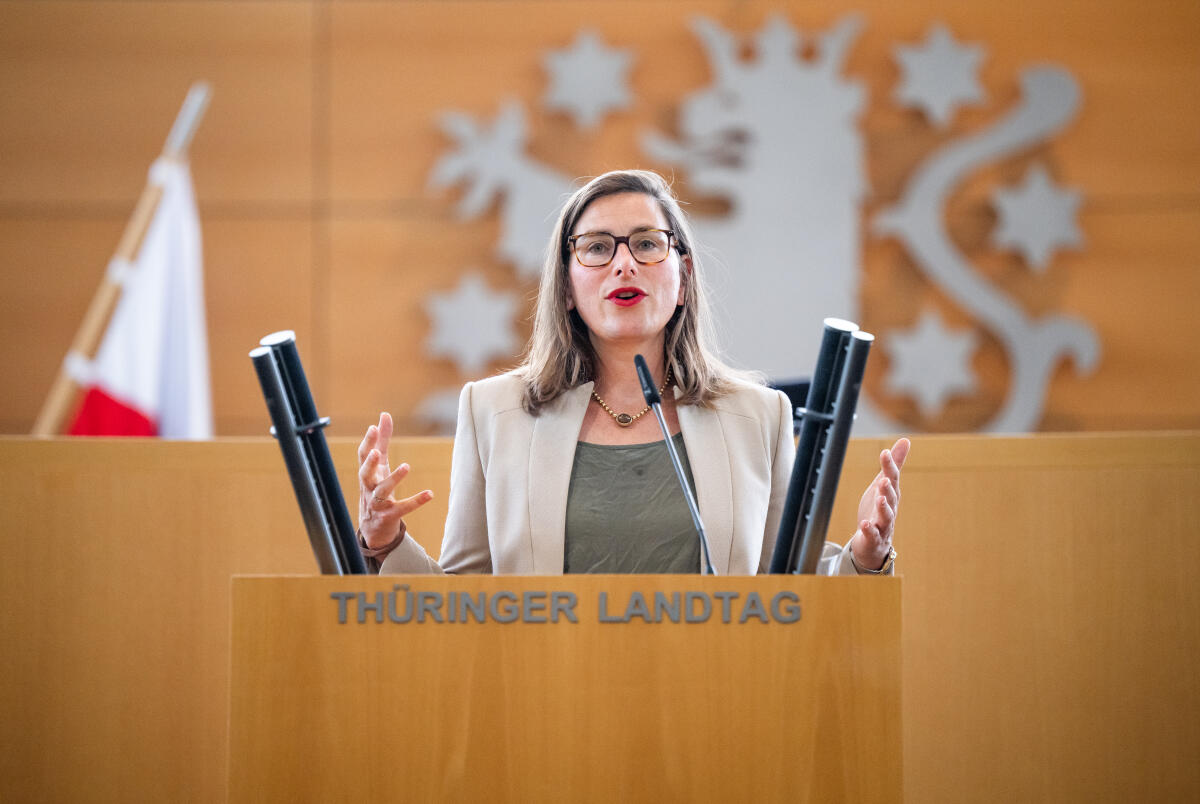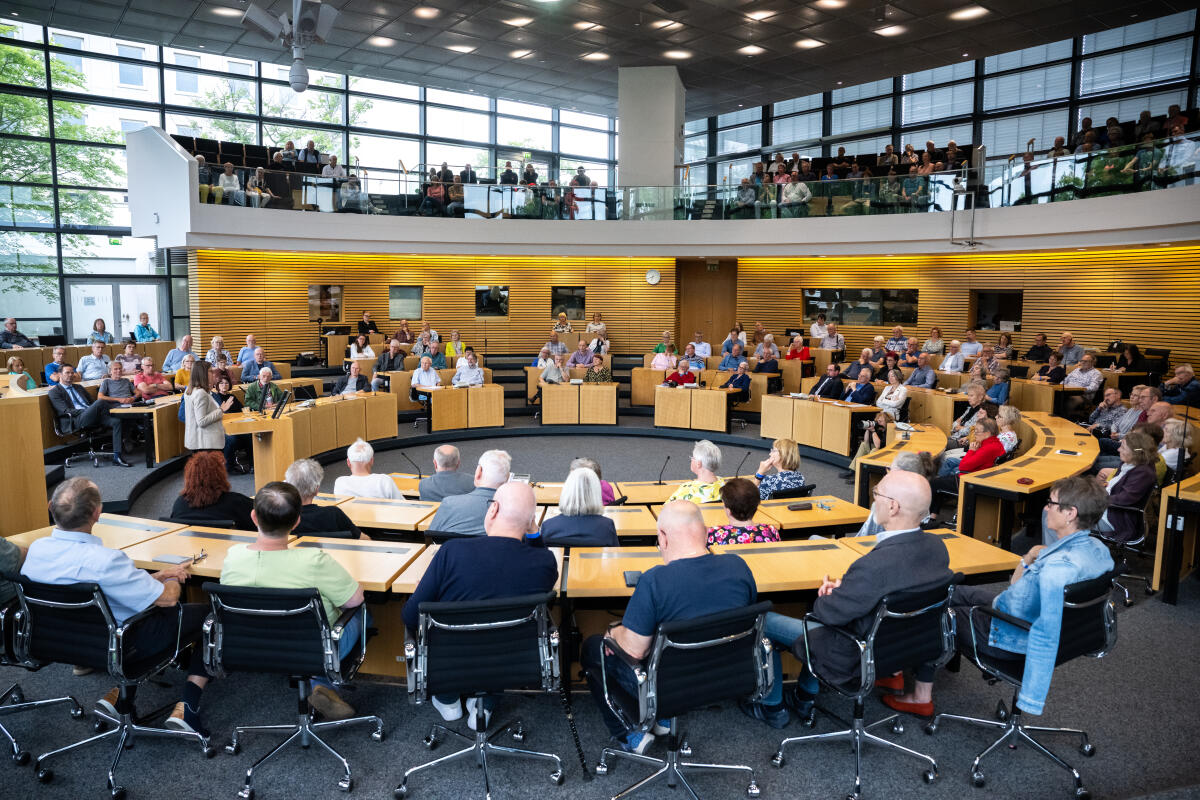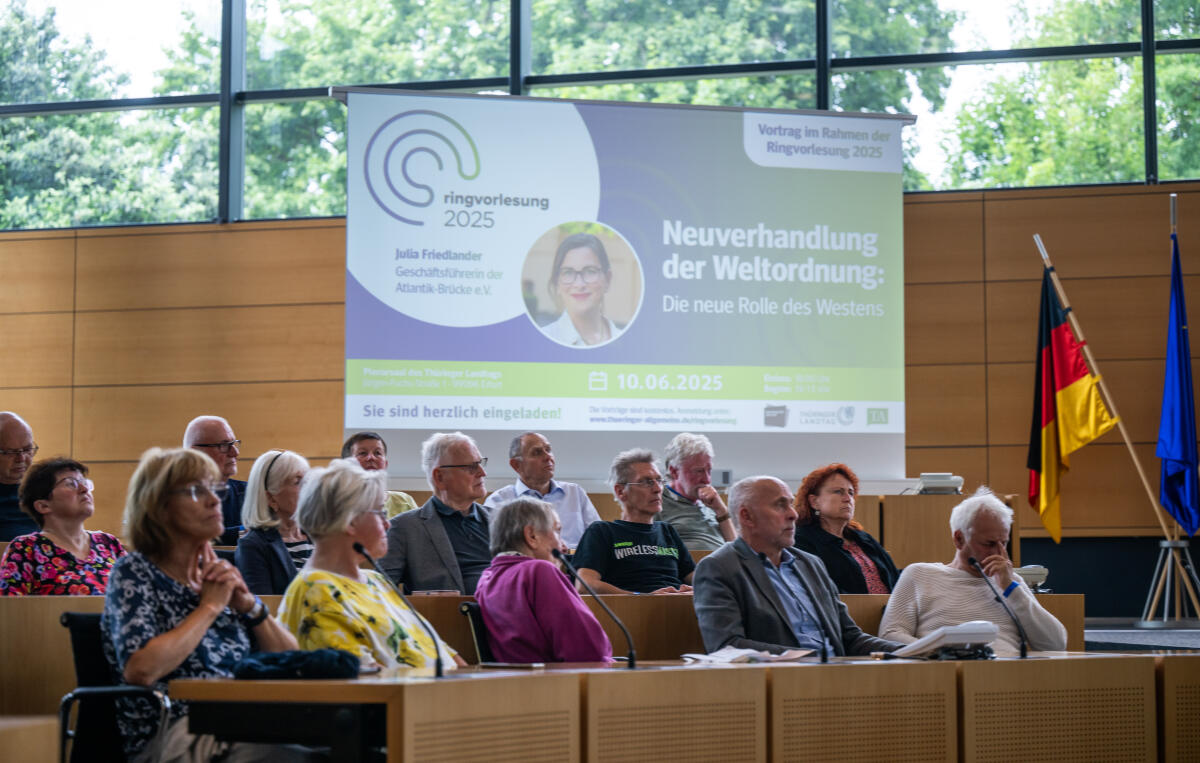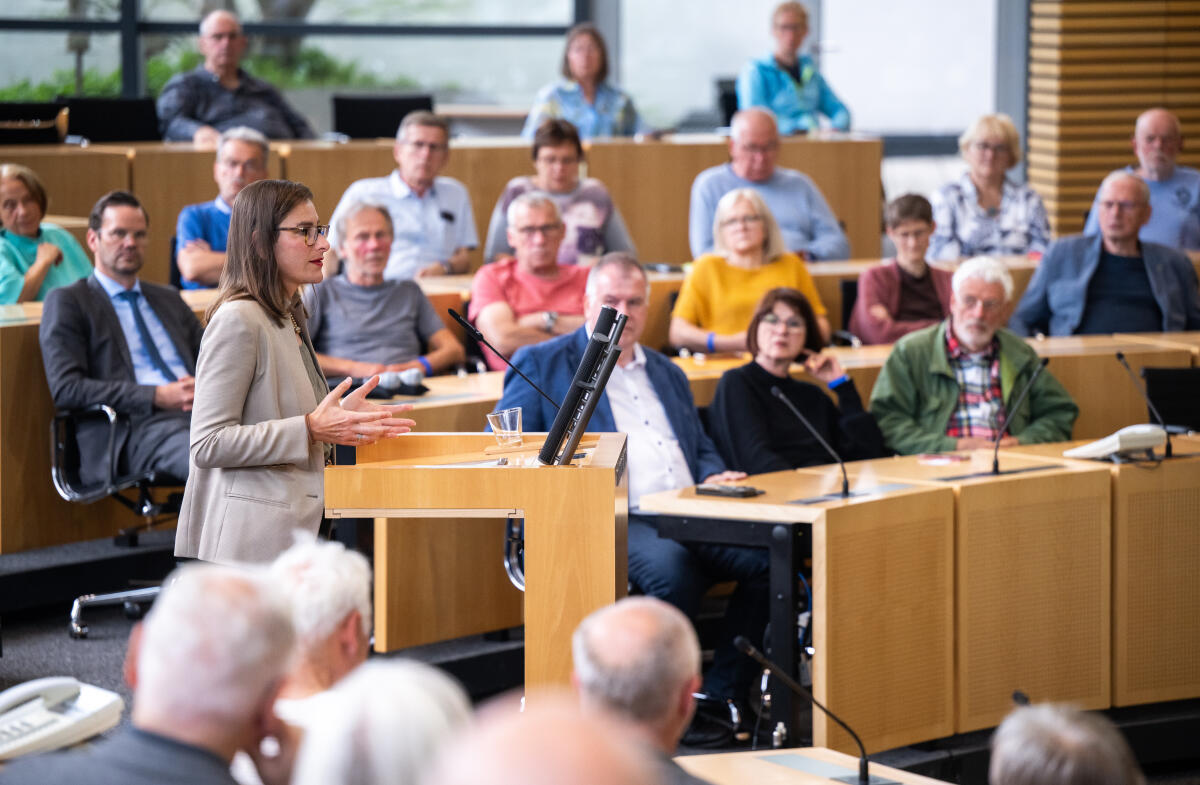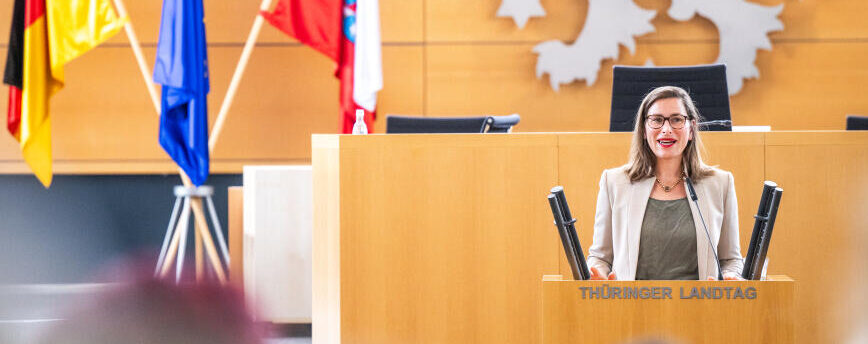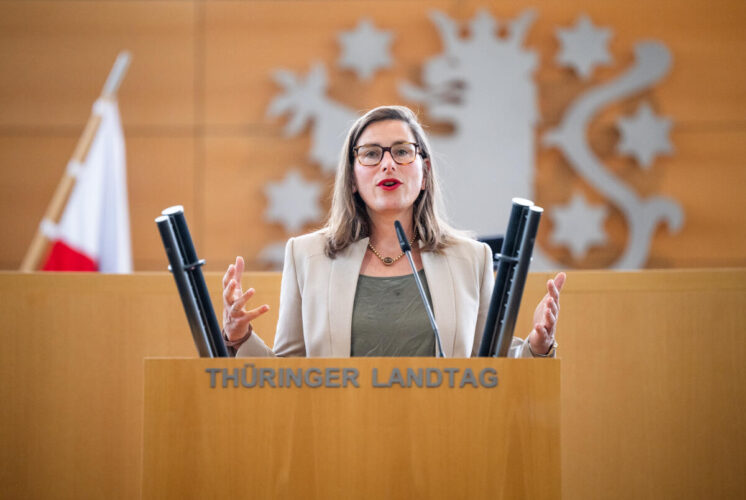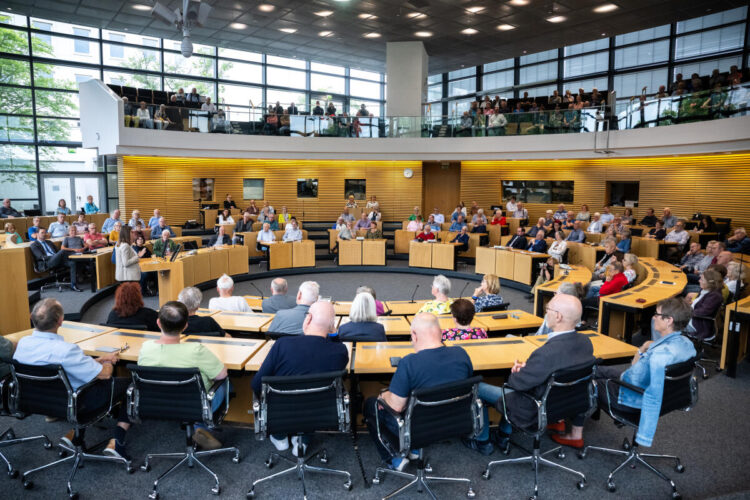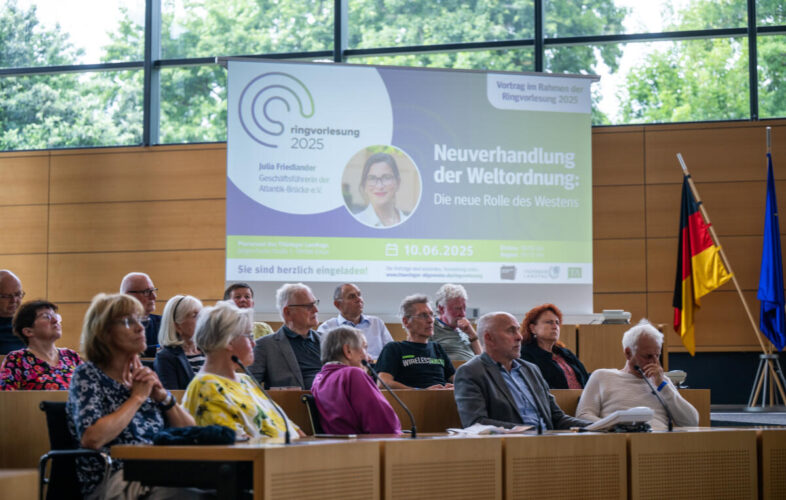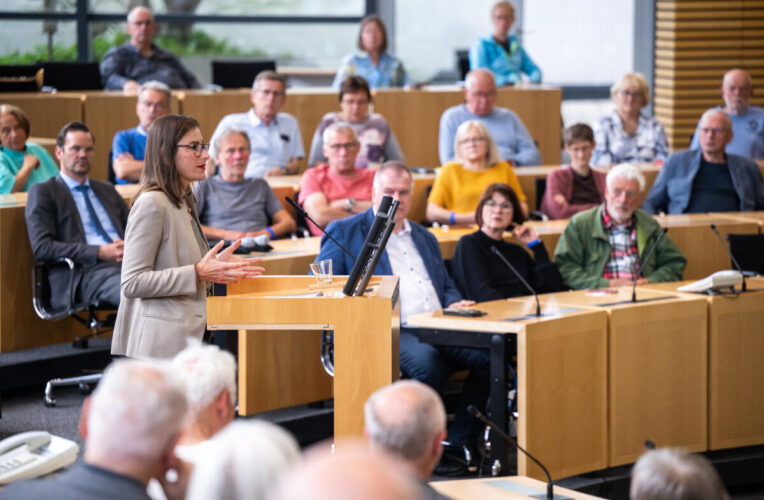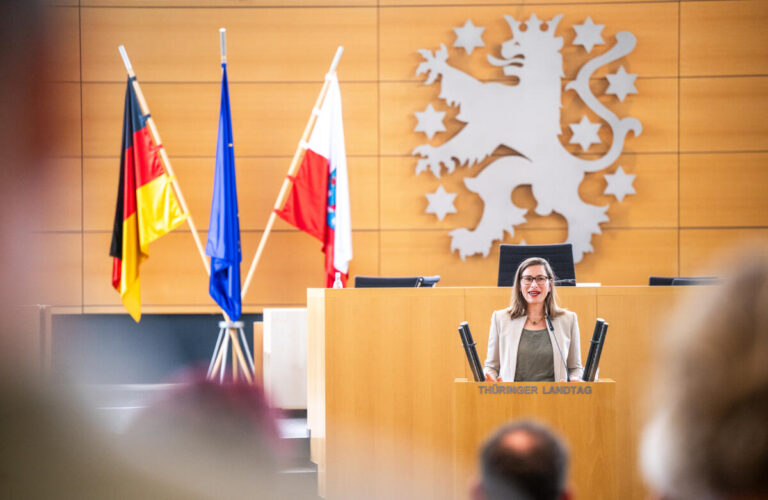“I refuse to cede my patriotism”
By Julia Friedlander
After fifteen years in Washington, serving in the US government under three presidents, it has been an honor to come to Berlin to lead the Atlantik-Brücke. While my mentors admitted this was not going to be a traditional move for an inside of the Washington political system, it would be the right move. One of them said to me: how does the transatlantic relationship become a functional thing in the 21st century, and not a relic of the Cold War?
Our founders were Jewish Germans who escaped persecution to the United States and returned after the war with hopes of rebuilding the country after the devastation of the war. They weren‘t sentimental people dreaming of joint folk festivals—they were realists. They made a strategic move in founding the Atlantik-Brücke. Only by convincing Truman to extend the Marshall Plan to West Germany and expediting NATO accession (just several years after the Grundgesetz and the East German uprising of 1953) could the Federal Republic return to growth and avoid the risk of further occupation by the Soviet Union. Germany was unconditionally defeated, and the United States catapulted to global predominance. How else was this going to work? No way else.
Of course, this history is the history of post-war West Germany. But neither Germany, East or West, would remain the standoff of all standoffs— a Soviet-American political tinderbox. My husband is from West Berlin, and at the age of 11, as the Wall fell, he biked to the Brandenburg Gate guided by a Mickey Mouse radio and took photos of his surroundings. The first bomb of WWIII won’t fall on our heads anymore, was the first thought. But what parents allow their child to bike alone into that kind of situation? The ones who had grown up protected by Allied soldiers (and Mickey Mouse). For America, ensuring that Germany became less of a geopolitical problem child meant “Europe whole free and at peace.” In other words, reunified, and subject to the two-plus-four agreement. The bilateral ties between Germany and the US were an existential foundation of global order—until they weren’t.
America’s Unipolarity Foregone
Fast forward to my professional lifetime: trade-fueled globalization, the financial crisis of 2008-10, the disaster of the Iraq War and neoconservative nation-building in Afghanistan—and we have an economically strained populace and an American empire in overreach. Empires have to pay it forward to maintain their status—and the US gladly contributed the largest share of the UN, NATO, and created the developing country status of the WTO. But the US was also ill-prepared for the world that it propped up to begin asserting itself. Western nations overlooked trade basics, that open markets create an overall increase of welfare for all participants, but also a convergence of wealth. And for America, Europe was no longer an aspiration project that provided the framework to keep Europe at peace once the Iron Curtain fell. As the US began to lose relative global influence, the EU signed the Lisbon Treaty. Through consolidation and regulatory power, the EU gained influence. The relationship between the US and Germany modernized as markets expanded and integrated. No longer the subject of foreign policy and divided by a wall that could start a nuclear war, Germany, and the European Union writ-large, became both a partner and a competitor to the United States.
Washington has long expected Germany to assume responsibility in global security commensurate to its GDP —and it’s fair to say Germany missed that message for a long time.
In my professional lifetime, no one in the United States has tried to “keep Germany down.” Washington has long expected Germany to assume responsibility in global security commensurate to its GDP as the world‘s third largest economy—and it’s fair to say Germany missed that message for a long time. Perhaps, one underestimated this power, or didn‘t realize, in medias res, how the bloc was growing in power and influence. The European Union transformed from a set of basic industrial agreements between a handful of Western European states into a regulatory market force that spans a population of 450 million—again, a sign of normalization and progress among advanced economies. Yet the leading “narrative” of the transatlantic world in Germany felt more like a beer tent friendship treaty than a modernized form of cooperation among equals in a competitive global environment. Conveniently, anything that wasn’t for the beer tent (like Obama‘s „pivot to Asia“or renewable energy subsidies through the Inflation Reduction Act) was not “in the interest of transatlanticism.” Kicking up dust on old points of contention and adding his own manufactured problems, Trump has broken the old narrative, definitively.
Maybe some of you followed the leak of the now-infamous Signal chat a few months ago. Besides divulging classified information they shouldn‘t have, Trump‘s cabinet engaged in a health round of Europe-bashing. Not only because one shouldn’t expect more from a bunch of insecure officials who prop themselves up by pushing others down, but because “where are the goddamn Europeans on this?” has been a question I was never fully able to answer when asked (or grilled) by my bosses.
By asking Allies to join the American security umbrella—in political lockstep with Washington and by purchasing American kit, the US has been able to have its cake and eat it at NATO.
Germany alone is not responsible for this dynamic—the American system has engaged in its own brand of self-delusion. By asking Allies to join the American security umbrella—in political lockstep with Washington and by purchasing American kit, the US has been able to have its cake and eat it at NATO. The arrangement has unquestionably paid dividends for the US over decades, ranging from extended nuclear deterrence to cheap basing rights. But (maybe by squinting) one can also see how null-sum thinkers like Trump view NATO as a protection racket where others were past deadline on their “dues”. Trump embodies a unique form of narcissism and myopia, but the status quo ante doesn’t make sense, either. As America, one can either buy fealty and accept “underpayment” or have an alliance among equals in a multipolar world. Through all of its criticism of Europe, the US has laid bare its own duplicity. And in doing so, it has demonstrated its need for European strength.
Economic Powers are Shifting
It is the result of a specific set of geographical, financial, and political factors that have allowed a country of 84 million people to become and remain the third largest economy in the world, especially after the global financial crisis and the multiple debt crises within the Eurozone just several years later. The integration of the European single market broke down barriers in investment, production and transport, quickly incorporating countries of the Warsaw Pact, and creating the world‘s most integrated supranational governance structure. And Germany acquired a huge domestic market without trade barriers and shielded from currency risk—non-euro currencies are pegged to the euro.
The eurozone crisis, spurred by overspending and overborrowing, put an abrupt end to unfettered European market expansion. Corporate and state lending dried up and austerity measures cut deeply into citizens‘ spending power. But Germany found a solution. Global markets were entering into a period of rapid expansion and offered a welcome platform for Western multinationals—German and American companies were equally grateful for the emergence of the so-called BRICS countries. Chinese demand scooped up Germany‘s export zeal just at the right moment when Southern Europe was in distress. Agenda 2010, Gerhard Schröder’s economic reforms–effectively surpressed domestic wages to keep production in Germany competitive, and prevented outsourcing of labor. Supplemental social services in Germany were bolstered by tax revenues from overseas expansion— gross national income instead of gross domestic product.
It was a clever but precarious set of circumstances. That golden moment restructured the German economy and its global dependencies, reorientating German industrial growth towards China in just a handful of years, but it proved fleeting. China has glaringly abused its status as a developing country to the detriment of advanced industrials—from the theft of intellectual property to forced joint ventures to state subsidization that distorted the entirety of global production. But it is not only China poised to limit our range of motion. Miniature trade arrangements between emerging economies and developing regions are cropping up through a web of bilateral and trilateral ad-hoc arrangements. While this behavior, in time, might help force new international trade rules, right now it looks like growing economies around the world are carving out new advantages while the heavyweights who drew up the rules revisit their own history.
The United States will likely do a lot less world policing than it has over the past several decades.
If the initial euphoria of economic integration was the first phase after reunification, the eurozone crisis and the embrace of global markets was the second. The third is hard to quantify, because we’re in it. China’s embrace of global trade imbalances as a national growth strategy is like the German export engine on overdrive. Add to this massive state subsidies of emerging technologies, the supply chains dislocations of the pandemic, and now the erratic, self-destructive trade policy from the United States, and we are witnessing a rapid global reconfiguring of economic power. Again, over the long view, this doesn’t have to be a bad thing. It’s not clear that the US needs to maintain a quarter of global GDP indefinitely in order to keep a lid on world stability— in fact, the United States will likely do a lot less world policing than it has over the past several decades.
What’s unsettling is that it’s not clear where this inquiry is taking us. The Trump administration is itself a symptom of a country not sure how to redefine its role in the global power balance when its own unipolar moment is irreparably gone. How often do Americans yell these days? Rarely do you find leaders screaming into the nothingness of the internet if they truly feel like they have everything under control. As the US grapples with declining power in a multipolar environment of multiple comparative advantages running criss-cross all over the map, there is clearly a big opportunity for Germany.
Germany’s Role
The peace dividend in Europe is long over. Not merely because of Russia’s brutal war, although that is and surely will remain the greatest security challenge for Europe. It has been over in parts and pieces for quite some time now. Russia’s invasion of Georgia in 2008, the failed revolutions of the Arab Spring in 2012, and regional instability from Assad’s brutal civil war in Syria, to Erdogan‘s crackdown on democratic institutions in Turkey, and the struggle to restrain nuclear proliferation in Iran all demonstrate that Europe’s world has been far from peace. There has been a de facto ring of fire around Europe for quite some time. In that sense, Olaf Scholz‘s Zeitenwende speech was the long-awaited moment we knew had to come: that the largest nation in Europe and the world‘s third largest economy now had a new role to play when that ring of fire is suddenly much closer.
The reality is, however: if Ukraine falls, so could its NATO neighbors.
Building Europe’s largest standing army is not the outcome anyone asked for. This is not how anyone wanted 2025 to look. Germany is putting its normative foreign policy aside and embracing Realpolitik—getting back to basics. For three years, support for Ukraine was often justified with the argument: we are helping the victim, defending global democracy and the rules-based world order. That in itself is admirable. But taking a step back, we have to ask ourselves: was this approach supposed to convince society of its moral duty or rather reassure it that the war was a concept and not a brutal thing just a few hours away? The normative argument kept the war as far away from themselves as possible. By making the argument that if Ukraine falls, Taiwan falls, politicians were able to invoke moral principles and repress the physical proximity of war. The reality is, however: if Ukraine falls, so could its NATO neighbors. Trump’s sell to the highest bidder approach to handling international relationships has ended America’s traditional view of its responsibilities in Europe. America will remain a strong military partner to Germany in Europe and remain at the core of NATO. That depends on Germany not seeing a figurative border between war and peace just a few hours east of here, but showing that Berlin will be the European leader, not an American follower. It means stating firmly: Ukrainians are defending Germany against Russia, full stop.
A new form of national pride
I was in graduate school in Washington when Obama was elected. I stood with several hundred thousand others in front of the US Capitol for hours at negative temperatures to see him take the oath. Some eager youth organization was distributing flags, and when I returned home from that very cold day I hung this flag in my window. When Trump was elected, my first order of rebellion was to stash this flag in the basement—I was not in a patriotic mood and didn‘t want implicitly to show support for a government I did not want to see elected. I didn‘t see the flag again for four years until Biden‘s victory was announced. I strapped the thing to the back of my bicycle and raced down to the White House to wave it in the direction of anyone looking. Predictably, Trump‘s reelection this past fall was a great disappointment, and the tumult of the past months certainly haven‘t reassured me in the trajectory of the country and how it will be governed. But I reached a different conclusion regarding my little flag. It didn‘t go back in the basement this time, I have it in the window of my office in Berlin. I refuse to cede my patriotism and belief in my country to an administration that views slash and burn as a legitimate tactic, employs racist provocations as a means of control, and creates an oligarchic cult of personality around the President. The flag is not the property of nationalists, they don‘t get to claim it.
I myself am a student of German history and belong to a German family. I know that displaying the flag—along with other symbols of national pride— has been politically wrought and often societally discouraged. Taking US behavior as a blueprint is naïve and uninformed. But the geopolitical environment demands greater stakeholdership in the structure of German and European societies— a contemporary form of national pride. Competing in a multipolar global environment requires investment in education, public infrastructure, defense and innovation. They are irreplaceable for the resilience of our political system, and to avoid the appeal of sloppy nationalism that takes easy versions of a complicated story, choosing scapegoats over substance. The new government and state-level leadership are well-placed to foster a new form of national pride in what Germany can offer itself and offer the world, and not let sloppy nationalists own the flag. Its colors, after all, represent democratic principles and liberal values of 1848, not in German nationalism.
Conclusion
The US had a peace dividend, too. The last time the government attempted to make drastic cuts to public spending was during the Clinton Administration— the cuts were drastic, albeit without the circus ride of Elon Musk. There were serious conversations (hard to imagine now) whether the US still needed the CIA. After all, the Soviet Union had collapsed, and former nuclear enemies were extending the olive branch. If that proposal had truly seen the light of day in the early 1990s, or been subject to review by today’s media landscape, it very well may have garnered a great deal of public support. In both the US and Germany, there will always be a reflex to pull back. As much as you may read about “great power competition” between the US and China, the global economy and power balance is beginning to look much more like a patchwork quilt than a standoff between rival blocks—Germany is only caught in the middle if it chooses to be. At this moment of disruption, Germany and Europe are well-positioned to take on global leadership at a time where America is lagging—and over the horizon, both nations will be grateful for it.
Julia Friedlander gave this lecture as part of a lecture series at the Thuringian State Parliament on the topic of “Renegotiating the World Order” on Tuesday, June 10, 2025.

